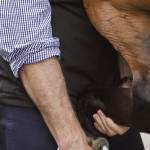Positive Effects of Glucosamine Supplementation in Young Horses

A study designed to investigate the effects of oral glucosamine supplementation in young horses was recently conducted at Texas A&M University. The 98-day study was set up to evaluate whether glucosamine HCl could affect joint inflammation and cartilage metabolism after an inflammatory insult.
The trial involved 14 Quarter Horse yearlings. The horses were divided into two groups and were fed grass hay and concentrate, each at a rate of 1% body weight (BW) per day. The horses in one group also received 30mg/kg BW of glucosamine HCl with the concentrate ration.
Two weeks before the end of the study, all horses were given carpal joint injections with a solution containing lipopolysaccharide (LPS) derived from E. coli. The solution was designed to cause joint inflammation. Synovial fluid was collected from all horses before the injections were given and at 6, 12, 24, 168, and 336 hours post‐injection.
Results showed that LPS injections increased levels of PGE2, an inflammatory mediator, and proteins involved in collagen metabolism in the synovial fluid of all horses in both groups. Horses that had received glucosamine HCl showed less increase in PGE2 than horses in the unsupplemented group. Supplemented horses also showed less evidence of collagen breakdown and more positive signs of collagen growth than horses that were not supplemented.
These results suggest that dietary glucosamine HCl supplementation could have a positive effect on joint inflammation and cartilage turnover in young growing horses.








